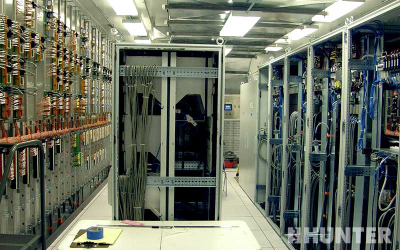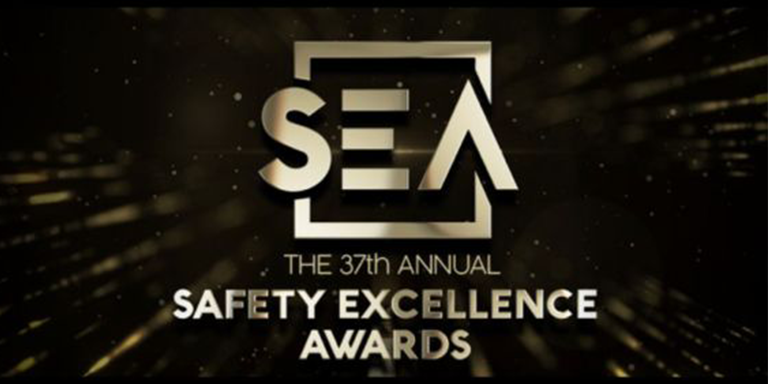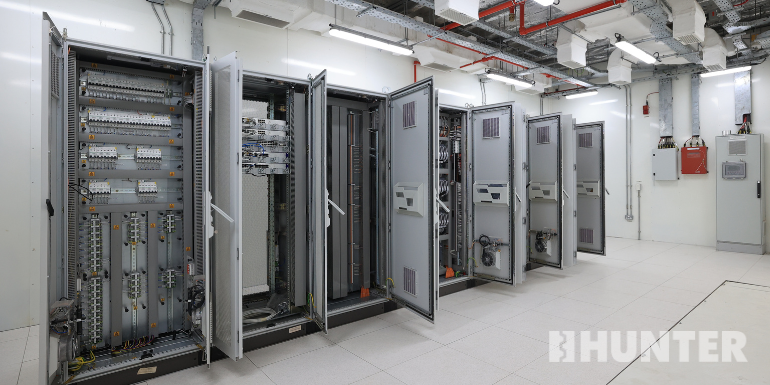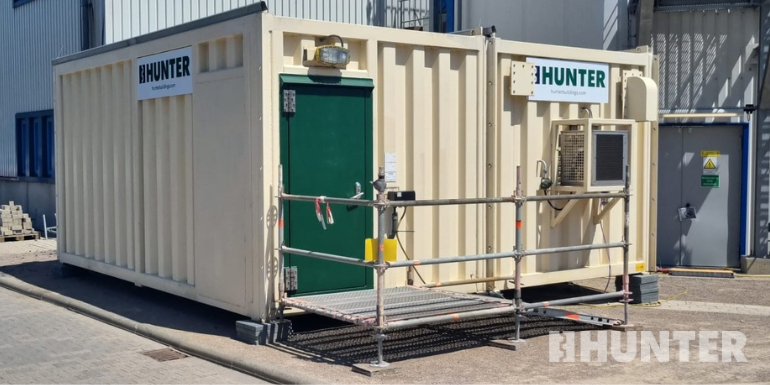A custom modular RIE (remote instrument enclosure) is an ideal way to protect crucial equipment and systems, and to ensure efficient operations. In a world that’s more connected than ever before, it’s common for companies in one corner of the globe to carry out daily work a world away. With issues such as harsh environments and vast distances to contend with, however, keeping critical systems communicating and crucial data protected is easier said than done. The RIE (remote instrument enclosure) has emerged as an indispensable asset.
Here, Hunter’s modular construction experts delve into the intricacies surrounding this important element of the modern-day jobsite. Read on for insights into ways RIEs support industrial operations and the systems that keep them running, and tips for securing the right RIE for your company’s needs.

What is an RIE (Remote Instrument Enclosure)?
An RIE is a specialized building designed to house and support critical instruments, control systems and other sensitive equipment in industrial settings. These enclosures play a crucial role in ensuring seamless operations, protecting data and extending the lifespan of the aforementioned systems and components. Let’s take a closer look at these structures’ key functions.
- Environmental Protection: RIEs are engineered to withstand harsh environmental conditions common at industrial sites, including extreme temperatures, humidity and exposure to dust or corrosive substances. This protection ensures the longevity and reliability of the instruments housed within and minimizes the risk of malfunction or downtime.
- Security and Access Control: Security is paramount in industrial settings, and RIEs are equipped with advanced access control systems to restrict entry only to authorized personnel. This helps prevent tampering, theft or unauthorized adjustments to critical equipment.
- Instrument Calibration and Maintenance: RIEs provide a controlled environment for instrument calibration and maintenance. The enclosed space allows technicians to work efficiently on the equipment without being affected by external factors, ultimately contributing to the accuracy and precision of industrial processes.
Factors to Consider When Incorporating RIEs into Worksites
There’s no such thing as being overprepared when planning the details surrounding protective structures for your industrial operations. A quality company will work with you to determine your unique operational needs, answer questions and help move your project successfully forward. Here are a few key issues to consider when planning for your company’s next RIE — or selecting the right manufacturer to help your project take shape.
- Customization Options: Every industrial operation has nuances that distinguish it from others — even others within the same industry. It’s important to seek RIE solutions that support your unique operational needs and the environment within which your RIE will sit. Discuss considerations such as size requirements, internal configurations and integration of specialized equipment or design elements. Hunter has proudly provided custom modular RIEs for companies around the globe, often incorporating elements that have never before been attempted.
- Scalability and Future Expansion: An RIE is a substantial investment. Ideally, a structure purchased now will serve industrial operations well for years (often decades). Factor how your organization’s needs might evolve with time — and what, if any, role your potential RIE might play in that growth.
Hunter’s custom modular approach to RIEs is an ideal option for most operations due to the structures’ sheer versatility. Repairs and updates are quick and easy, while multi-module layout options allow you to accommodate growing teams or shifting needs. And when a project reaches completion in one place, modules can be relocated elsewhere. - Compliance with Industry Standards: Adherence to industry standards and regulations is non-negotiable, as those guidelines are in place to protect workers, those around them and the surrounding environment. And regulations vary from one part of the world to the next.
Verify that your chosen RIE solution complies with relevant safety, environmental and quality standards to ensure legal and operational compliance. Failure to do so can result in costly penalties, time-consuming rebuilds and, most important of all, health and safety concerns that place lives at risk. The design-build team behind your RIE should be well versed in the guidelines that dictate your particular project needs. - Aesthetics and Integration with Surroundings: Although functionality is the most important aspect of any industrial structure, the visuals matter, too. Does your organization have a custom color palette you incorporate into your buildings? Are there unique architectural details you’d like added in, if possible? Would your RIE benefit from camouflage efforts?
Be sure to communicate any aesthetic preferences with your potential RIE provider to determine whether they can accommodate your needs — and how/if those factors will impact your project’s timeline and budget. At Hunter, we’re no strangers to custom requests and will work closely with your team to ensure a finished product that looks exactly like you want it to.
Why a Modular Construction Company is an Ideal Partner for Industrial RIE Needs
Although we’ve already touched briefly on the benefits custom modular RIEs offer, it’s worth going into further detail. Your RIE manufacturer’s approach to construction can be nearly as important as the completed product. Here are a few key reasons modular construction is Hunter’s go-to approach for quality remote instrument enclosures.
- Modular Construction is Good for Timelines and Project Budgets: Studies show modular builds reach completion in about half the time — and for about half the cost — as compared to traditional construction techniques.
- Modular Construction Offers Environmental Benefits: A modular approach generates less material waste throughout the building process, while also requiring far less energy usage. Modular structures are an ideal option for companies seeking out ways to reach green standard goals.
- Modular Construction is Limited Solely by the Imagination: Modern-day modular buildings have evolved from the boxy structures of years past. Today’s options can be tailored to suit virtually any operational need or aesthetic preference. At Hunter, for instance, our project portfolio includes everything from stacked, multi-unit structures, to single-unit builds and tailored options such as custom flooring. We like to say that if you can think it, Hunter can make it.
Remote instrument enclosures play a pivotal role in maintaining the efficiency and reliability of industrial processes — and Hunter is proud to play a role in helping successful projects take shape. If you have questions about any of the above, or if you’re interested in incorporating a custom modular RIE into your industrial operations, please feel free to contact the Hunter team. We’re here to help, and we look forward to working with you.



